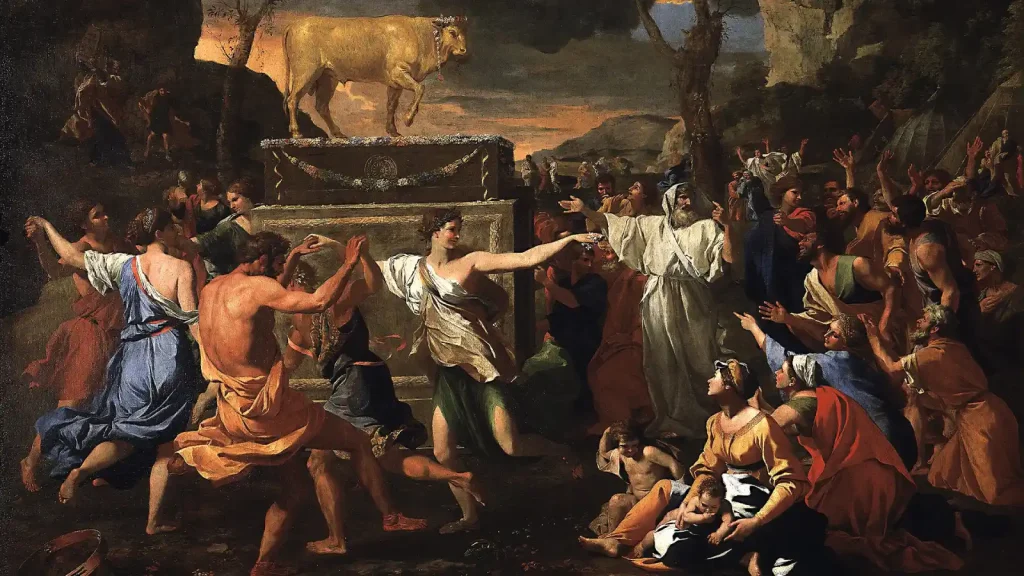In Landscape and Memory episode 5: historian Simon Schama takes us on a journey into the heart of Arcadia—a concept steeped in culture, mythology, and the relationship between humanity and the natural world. This final installment delves deeply into how the ideal of Arcadia has influenced our imagination, focusing on how artists, philosophers, and writers have painted and penned their own visions of this pastoral paradise.
Schama draws from the works of some of the most influential figures in Western culture, such as Poussin, Horace, Virgil, Rousseau, and Thoreau, each contributing to the rich tapestry of Arcadian myth. Poussin’s evocative landscapes, filled with serene figures in idyllic settings, bring to life the very essence of Arcadia. His painting, Et in Arcadia Ego, does more than portray a beautiful landscape; it carries with it a deeper memento mori—a reminder that even in paradise, death is never far away. The philosophical layers of this artwork connect the viewer with timeless questions about the coexistence of joy and sorrow, life and death.
Simon Schama’s exploration is a masterful blend of art history and cultural analysis. He positions Arcadia as more than just a landscape; it’s a symbol of our collective longing for a simpler, more harmonious relationship with the natural world. From the works of Horace and Virgil, we see the roots of this ideal emerge in classical literature. These Roman poets envisioned Arcadia as a serene countryside, a place where shepherds lived uncomplicated lives, immersed in nature’s bounty. The writings of Horace paint vivid images of a balanced life, a retreat from the excesses of urban existence—a sentiment echoed by Virgil’s pastoral visions in the Eclogues.
This idealized vision of Arcadia found renewed resonance during the Romantic period, with thinkers like Jean-Jacques Rousseau and Henry David Thoreau. For Rousseau, Arcadia symbolized the purity of mankind in its natural state, untainted by the corruption of society. His work, Reveries of a Solitary Walker, captures a longing for personal freedom and an intimate connection to nature—a return to an Arcadian state of being. Thoreau’s Walden similarly reflects this desire, focusing on the idea of living deliberately, surrounded by the simplicity and truth that nature provides. Schama skillfully draws parallels between these writers, illustrating how the idea of Arcadia evolved across time, adapting to the cultural currents of each era.
At its core, the episode invites us to reflect on the timeless relationship between culture and nature. Simon Schama, with his nuanced narrative, weaves through centuries of art and literature, highlighting the enduring power of the Arcadian myth. It’s a myth that speaks to the ideal landscape—one untouched by human greed, where nature and man exist in perfect harmony. This vision of Arcadia is more than a nostalgic yearning; it is an ongoing dialogue about our place in the world and our relationship to the environment.
Arcadia also offers a glimpse into humanity’s yearning for something beyond the confines of civilization. Poussin’s The Pastoral Concert exemplifies this notion, portraying musicians and muses in an idyllic setting that evokes a sense of both celebration and nostalgia. The painting symbolizes an idealized harmony that many cultures have aspired to—a state where art, nature, and human joy intertwine seamlessly. Schama delves into how these images have shaped our perceptions of what a balanced life looks like and how they reflect an ideal that we continually strive for but rarely attain.
Throughout the episode, Schama’s voice serves as a guide, weaving storytelling with historical detail. He takes us from the sunlit groves of Poussin’s paintings to the reflective prose of Thoreau, reminding us that the notion of Arcadia is not fixed—it evolves as our understanding of nature and our cultural values shift. The idea of a pastoral paradise was not just a Roman fancy or a Romantic dream; it remains relevant today as we grapple with environmental crises and seek a path back to living in balance with the earth.
The theme of Arcadia resonates particularly in our modern context, where the relationship between culture and nature is more complex than ever. In an age dominated by technology and urban expansion, the longing for an Arcadian escape speaks to a deep-seated desire to reconnect with the natural environment. Schama taps into this yearning, suggesting that our fascination with the pastoral—whether in art, literature, or environmentalism—reflects an intrinsic part of the human spirit. We crave a simpler life, one where we are not alienated from the very landscapes that sustain us.
Landscape and Memory episode 5 – Arcadia
Landscape and Memory episode five isn’t just about the beauty of paintings or the eloquence of classical literature. It’s a meditation on how the myth of Arcadia has shaped our cultural consciousness. Schama reveals how the pastoral ideal—whether through the idyllic verses of Virgil, the philosophical musings of Rousseau, or the serene canvases of Poussin—has served as a mirror, reflecting our hopes, fears, and contradictions. The idea of Arcadia compels us to consider what we value, urging us to find balance in a world that often feels anything but harmonious.
As Schama concludes his exploration, we are left with a powerful message: Arcadia may be an unattainable ideal, but it is also an aspiration worth pursuing. It represents a vision of humanity in sync with nature—a reminder that, despite our progress and our technology, there is something profoundly fulfilling in the simplicity of nature. It’s an ideal that has inspired generations of artists and writers, and it continues to inspire us today, as we seek to find our place within the natural world.
In this episode of Landscape and Memory, Simon Schama doesn’t just examine Arcadia; he brings it to life, inviting us to explore its meaning and significance in our own lives. Through the lens of art, literature, and philosophy, we come to understand that Arcadia is not just a distant past or a romantic dream—it’s a reflection of our deepest desires for a world where beauty, simplicity, and nature are cherished above all else.
Conclusion Landscape and Memory episode 5 – Arcadia
As we reach the end of this journey into Arcadia, it’s clear that this concept is much more than an idyllic landscape or a nostalgic dream. It is a timeless symbol of humanity’s desire for harmony, simplicity, and a connection to the natural world. Arcadia embodies our yearning for a life where we can pause and find tranquility, far from the complexities and demands of modern existence.
Simon Schama has shown us that Arcadia is not a fixed place; it is a living idea, one that evolves with each generation’s hopes and fears. Through the eyes of artists like Poussin, the words of poets like Virgil and Horace, and the musings of philosophers like Rousseau and Thoreau, we see how this pastoral ideal continues to resonate. Each interpretation brings something unique, adding layers to the rich tapestry that Arcadia represents—an ideal of beauty, simplicity, and balance.
In today’s fast-paced, technologically driven world, the idea of Arcadia serves as a reminder of what we might be losing. It calls on us to cherish the landscapes that sustain us and to find joy in nature’s simplicity. This vision of Arcadia is an aspiration—a guiding light that points us back to what truly matters. It suggests that perhaps the answers we seek are not in the relentless pursuit of progress but in embracing the natural world with a sense of humility and wonder.
Arcadia challenges us to rethink our relationship with the environment. It pushes us to imagine a world where we live in sync with nature, where the beauty of the earth is not a backdrop but an integral part of our lives. As Schama reminds us, though Arcadia may seem unattainable, striving for it is what makes us human. It inspires us to seek balance, to nurture our surroundings, and to aspire toward a life filled with both beauty and simplicity.
In the end, the true power of Arcadia lies in its ability to inspire—to remind us of a world where culture and nature coexist in harmony. It invites us to look beyond our hectic lives and to find, even if only briefly, a piece of paradise within ourselves.
FAQ Landscape and Memory episode 5 – Arcadia
Q: What is the central theme of Landscape and Memory episode 5?
A: This episode delves into the concept of Arcadia, exploring its significance in Western culture. It examines how this ideal of a harmonious relationship between humanity and nature has been interpreted and reinterpreted throughout history. Simon Schama, the historian, guides viewers on a journey through art and literature, showcasing how Arcadia has been depicted and understood.
Q: How does Simon Schama connect the idea of Arcadia across different time periods?
A: Schama masterfully interweaves the works of various figures like Poussin, Horace, and Thoreau. He illustrates how each of these individuals contributed to the Arcadian myth. Furthermore, he demonstrates how the concept evolved, adapting to different cultural and philosophical movements, from classical poetry to Romantic ideals.
Q: What is the significance of Poussin’s painting, Et in Arcadia Ego, in the context of Arcadia?
A: Poussin’s painting serves as a visual representation of the complexities within the Arcadian ideal. While depicting a seemingly perfect pastoral scene, it also includes a tomb, reminding viewers of mortality. Consequently, it prompts reflection on the coexistence of life and death, joy and sorrow, even within a paradise.
Q: How does the episode connect the concept of Arcadia to modern-day concerns?
A: In a world grappling with environmental challenges, the episode highlights the enduring relevance of Arcadia. It suggests that this longing for a simpler, more balanced relationship with nature resonates deeply with our current desire to reconnect with the natural world and find solutions to environmental issues.
Q: Why is Landscape and Memory episode 5 relevant to viewers today?
A: The episode offers a compelling exploration of a timeless theme. It encourages viewers to consider their own relationship with nature and to contemplate the enduring power of the Arcadian ideal. Ultimately, it prompts reflection on our place in the world and inspires us to seek harmony with the environment.




